Indifference
Starring: Helen Kane, Victor Moore, James Hall, Stuart Erwin
Directed by: Malcolm St. Clair
Released by: Paramount
Runtime: 73 minutes
Release date: July 5, 1930
Availability
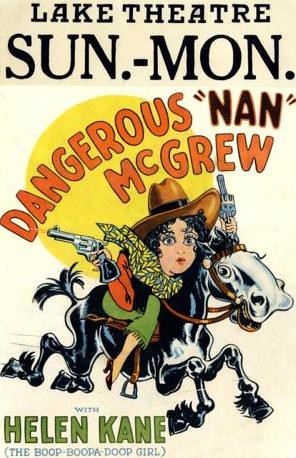
Released by Paramount Pictures, their back catalog from this era is now owned by Universal Studios. I found two copies online and they’re both in rough shape. Here’s the one over on Archive.org.
Powered by JustWatchDangerous Nan McGrew: Hardly
“All I know is that you’re a murderer and you’re wanted for $10,000!”
“And I could murder you too!”
“That would make it $20,000!”
You have to feel bad for Helen Kane. The flapper turned performer turned movie star is now pretty much remembered by film fans as the claimed inspiration for cartoon flapper rebel Betty Boop, and, watching Dangerous Nan McGrew, you can see every squeaky syllable that the cartoon character would become known for. Kane’s career would flounder as Boop’s star would shine, and this film, a forgettable talkie that feels just like the best everyone could manage that still didn’t result in much, gives the feeling that Kane’s fortunes were perhaps curtailed by faulty technology and just really lousy writing.
Nan McGrew (Kane) is trekking across Canada with Muldoon (Victor Moore) as part of a rinky dink medicine show. After they accidentally acquire a fleeing murderer, Foster (Morgan) as a castmate/kidnapper, they wind up in a small mountain town for Christmas. A dopey guy, Eustace (Erwin), falls quickly for the nubile Nan, especially after she serenades him with her ‘Boop-A-Doop’ number clad in a scanty cowgirl outfit. He invites the clan to his mother’s house to perform for Christmas dinner. Foster opts to use the opportunity to stage a stickup– always a good time where you have the titular Wizard of Oz dressed as Santa Claus and waving a gun wildly. The film eventually concludes in a manic Scooby-Doo-style chase sequence of slamming doors and running down hallways.
The Wikipedia page for this movie says that this set piece is a nod to Ernst Lubitsch. I am not sure I agree.
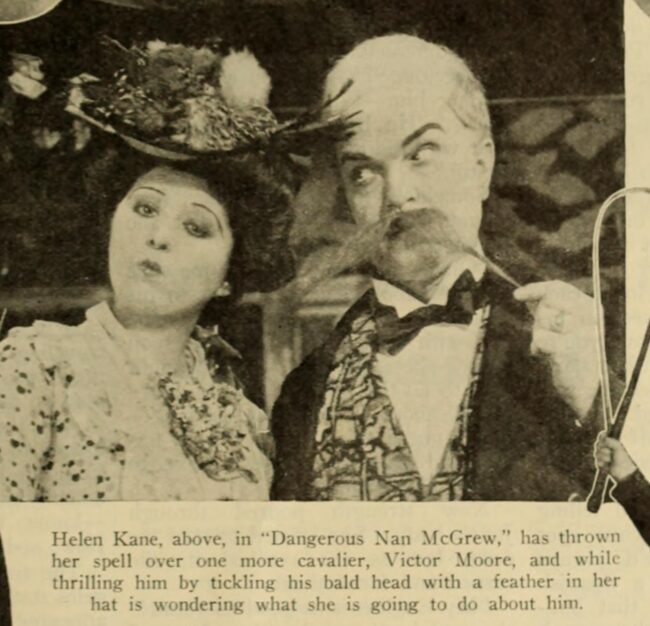
Despite its high-energy poster, Dangerous Nan McGrew is a typical picture from 1930, fairly inert and slow. It’s a comedy film, or at least labeled as such by those unable to piece anything else about the picture together. There aren’t really laughs in the movie, but then again it’s fairly difficult to tell if there are any jokes, either. Our introduction to Erwin is him getting pummeled on a snowy cliff side. “Everything went black,” he tells his mother. “You mean everything went white!” she snaps back. That’s comedy, I suppose?
Other sequences involve people drinking or hooting and hollering. The worst parts of the picture are the dismal bouts of wordplay, which, considering this was a talkie, is pretty damning. One innovation is to give Stuart Erwin’s character a quirk– he plays the saxophone and carries it around with him. His playing is supposed to be bad, but maybe sometimes good, but the filmmakers bet a lot on the idea that a wealthy nebbish Canadian saxophonist player was just funny enough on its own. Maybe there’s still potential there, but as far as I know no one else has tried basing an entire motion picture comedic arc on that concept alone since.
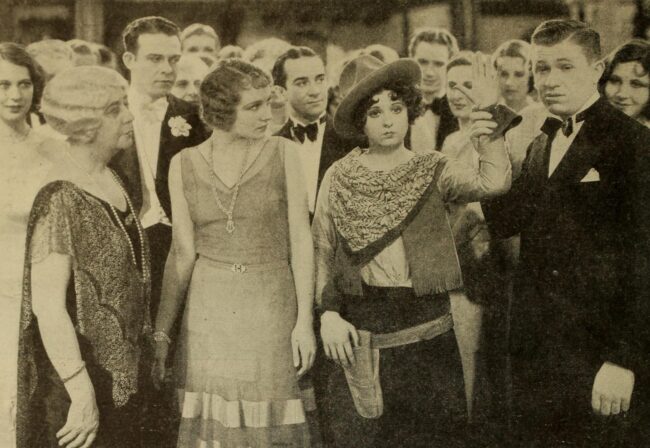
Kane gets a trio of musical numbers here, including her most famous hit, “I Want to Be Loved By You”, and the titular “Dangerous Nan McGrew”. They’re the highlights of the picture, insomuch as she has some talent and they were enjoyable to listen to. Kane is fine in the movie, and fits in the kind of mold Una Merkel or Ethel Merman would eventually dominate.
The condition of the print I found is abominable, and probably the only reason I couldn’t rate this as ‘Dislike’ is that I couldn’t see it that well; for all I know, one of those slow moving blobs on screen may have been riotously entertaining. Otherwise, Dangerous Nan McGrew is a movie so slight and harmless, it’s hard to get mad at.
Trivia, Links, Etc
- This is the only starring vehicle for Helen Kane. She had appeared in a handful of Paramount pictures in 1929 and 1930, with her next film, 1930’s Heads Up, being her last major role in a motion picture.
- Just a note on some of the names above. IMDB and Letterboxd have Moore as Muldoon and Morgan as Doc Foster, while this is reversed in the movie. At least, I think so. The version of the movie I caught had the film’s lip syncing off by a good 10 seconds, so maybe I’m just confused. No matter, I am at least 95% sure that Helen Kane plays Nan McGrew.
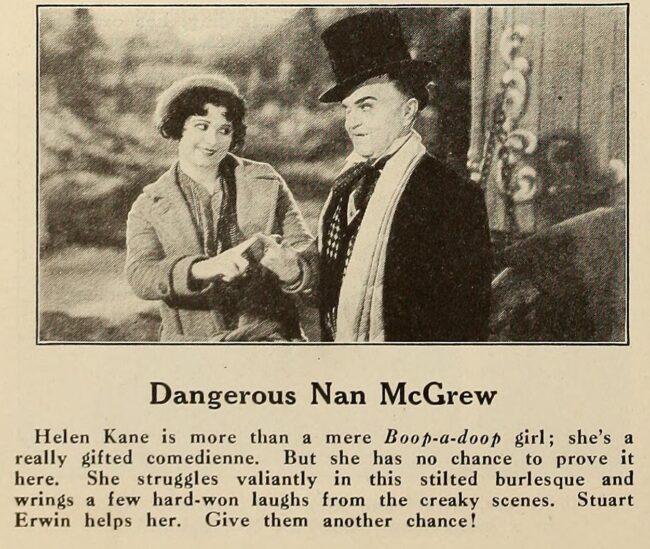
- Helen Kane would sue Fleischer Studios for ripping off her image for the creation of Betty Boop in 1932. The trial was thrown out after the defense claimed that lots of people talk like how Kane talked and it wasn’t fair to say that she’s the only one who looks and sounds like that. The judge would throw out the case in 1934. Whether or not Fleischer Studios would come to admit that they did actually base the character on Kane comes down to whether you believe unsourced Wikipedia claims versus Fleischer fan blogs. It looks like you can also read a great deal of the case’s transcripts in Helen Kane and Betty Boop: On Stage and On Trial by James T. Taylor, Jr.
- In weird kind of ‘adding insult to injury’, Fleischer would release a Betty Boop short in 1931 called “The Bum Bandit” (!) where Boop played … Dangerous Nan McGrew. (If you watch the short below, it should be noted that Betty is still very much in her hybrid human/dog form she’d have in her first few appearances, which is, uh, kinda hideous.)
- The title character of ‘Nan’ McGrew is a play on ‘Dan McGrew’, subject of the 1907 poem “The Shooting of Dan McGrew” by Robert Service. The poem would inspire a full-length novel in 1915 from Marvin Dana, plus two silent film adaptations in 1915 and 1924. From what I read, Helen Kane supposedly invented ‘Nan’ for the song she sings here in the movie which I believe was a part of her stage act that she then transferred over to the studio for her starring role, but I don’t have a solid source to back that up.
- I felt kind of bad finding Dangerous Nan McGrew so utterly charmless until I saw 1930’s New York Times review (presumably from Mordaunt Hall), which reads:
Despite the presence of Helen Kane, Stuart Erwin, Victor Moore, Frank Morgan and Louise Closser Hale, all comedians, in the film at the Paramount, “Dangerous Nan McGrew” isn’t funny. This picture somehow fails to come off in as many instances as there are supposedly humorous situations. It is scarcely aided by Miss Kane’s technique in “boop-boop-a-booping.”Miss Kane’s peculiar advantage in rendering songs in her own original manner is no doubt the reason for her being the heroine of this audible film. It must be, for she only succeeds in acting in a tediously cute manner in the non-musical intervals
- Next time someone starts on their ‘Die Hard is a Christmas movie!’ rant during the holiday months, I will shoot back ‘Oh yeah, 1930’s Dangerous Nan McGrew starring the Boop-A-Doop Girl Helen Kane is also a Christmas movie!’ and watch them slowly, slowly back away.
Other Links
What is Pre-Code?
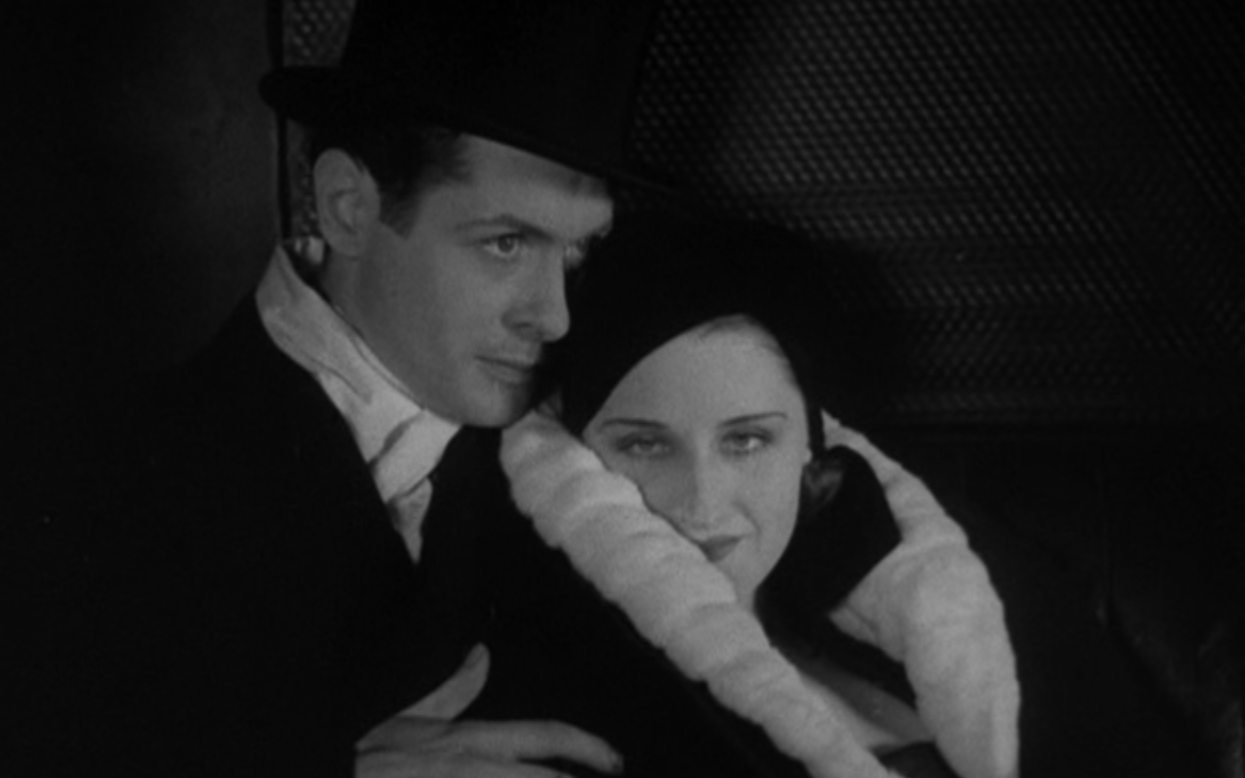
Click to learn more about pre-Code Hollywood, 1930-4, when movies were sexy, smart and sophisticated.
Index of Film Reviews
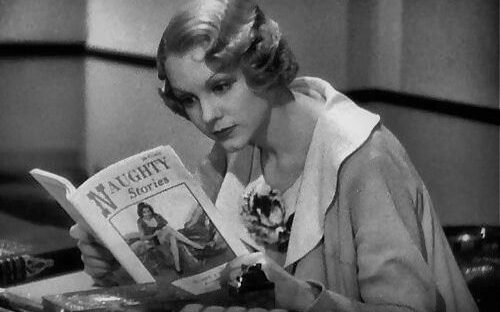
Browse all of the movie reviews on the site as well as schedules and pages that detail the world of pre-Code.
Explore the Pre-Code Era
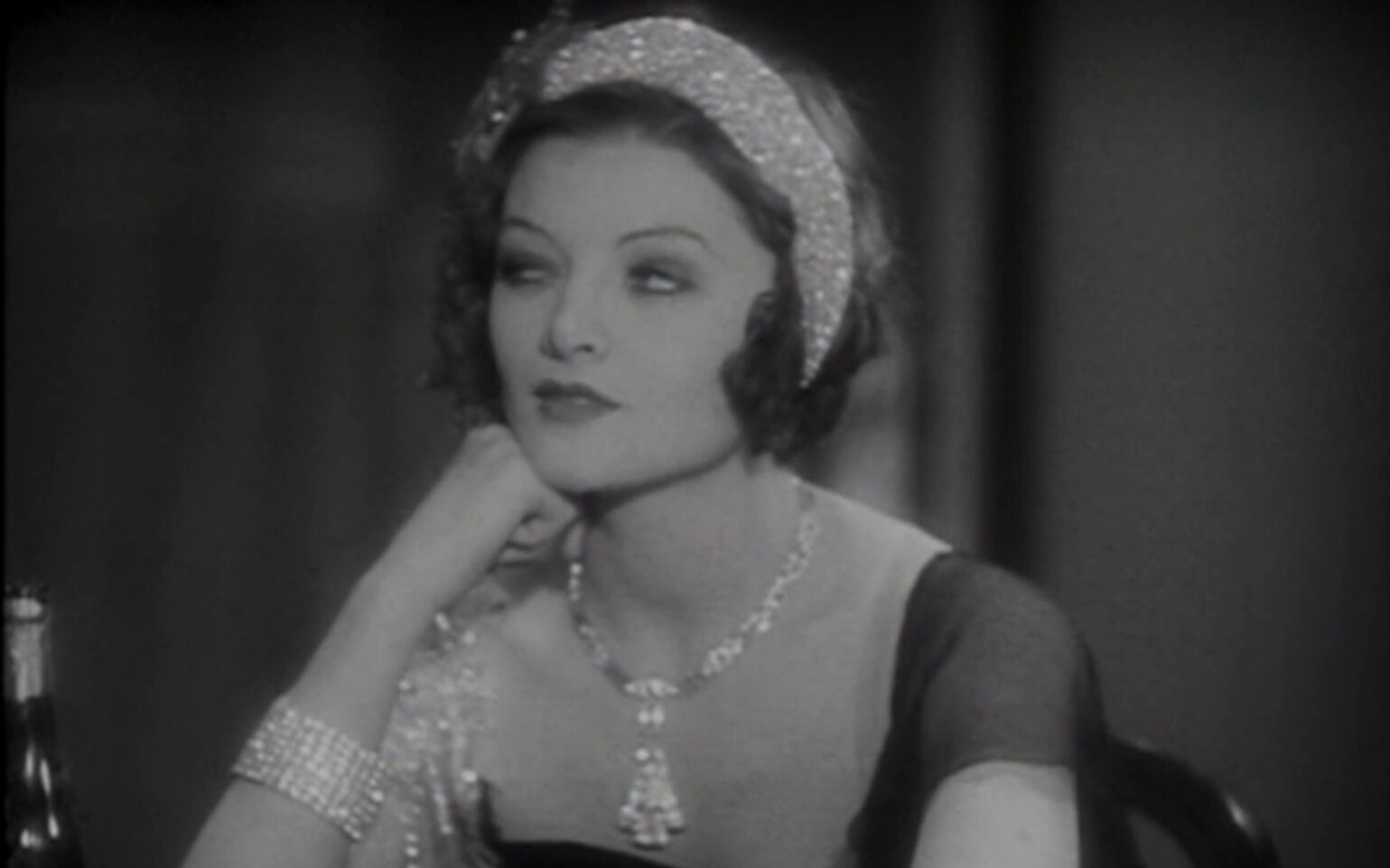
Dig through the pre-Code era through its highlights, its biggest hits, its essential films, and more.


